
Righteous Among Nations
Non-Jewish Neighbors, Schoolmates, and Friends
Who Risked Their Lives to Save Jews in Skala
Click on photos to enlarge
In darkest moments of that endless night,
their wondrous virtuous souls provided light,
a lustrous miracle of love that shined
upon the greatest sin of humankind.
(c) Copyright Helene Kenvin
The Righteous Among the Nations (Hasidei Umot HaOlam) are non-Jews who helped to save Jews during the Holocaust. There were good people in Skala who have been awarded this honored title by Yad Vashem, in recognition of the life-saving assistance that they gave to Jews who were in danger of being murdered by the Nazis and their heinous collaborators.
THE HEROISM OF NIKOLAI GETMAN
AND OLENA MARTYUK KOVALISHINA
From the Archive of Yad Vashem
Sholom Edelstein, his wife, and his son Munio lived in the town of Skala Podolska, Borszczow region, Tarnopol district, in today's Western Ukraine. The German conquest of the region began in July, 1941. Until September, 1942, the Jews continued to live in their homes in the town. On the first day of Sukkot, 1942, an aktion began during which Sholom's wife was murdered. Days thereafter, Sholom and Munio found themselves in the Borszczow ghetto.
On an October day in 1942, Munio noticed a wagon near the ghetto. Its driver called to him by name. It was Nikolai Getman, who had been a customer of the Edelstein family before the war. He instructed Munio to tell his father
that he should not stay in Borszczow and offered to smuggle the Edelsteins out of the town.
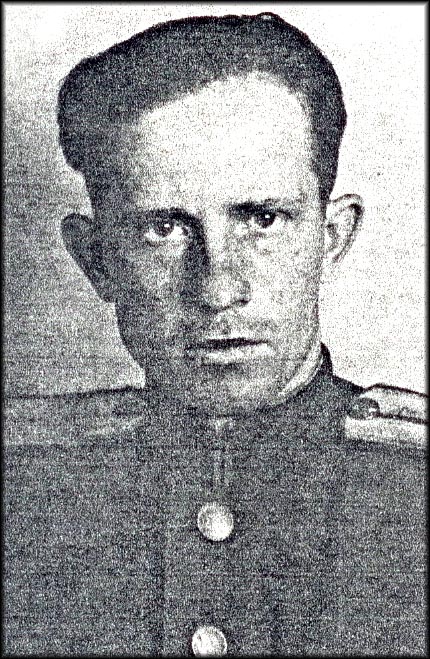
1. Nikolai Getman |
The next morning, Getman and the Edelsteins met again. Sholom was hidden in the wagon and Munio sat next to Getman as they drove to Skala. In those days, there were a number of Jews hiding in the forests near Skala. Getman suggested that Sholom and Munio join them.
The Edelsteins went into the woods and hid in a bunker until the beginning of winter. When the ground was covered by snow, they feared that traces of their footprints in the snow around the bunker would reveal their hiding place, so they were forced to find another place to hide. |
Sholom, Munio, and a young boy named Leonya returned to Skala and hid in the basement of a deserted house. At night, the two boys snuck out to beg the local people for food. Most of their former neighbors refused to help them and some even threatened to betray them to the authorities. [Editor: Unlike others who informed on Jews, Nikolai Getman never told the authorities where the Edelsteins were hiding.]
Only one woman, Olena Martyuk Kovalishina, agreed to provide them with food on a continuing basis. She did this throughout 1943 until the liberation of Skala in 1944. Munio and Leonya would leave their basement hideout and sneak to her house once or twice a week and she would give them bread, a pot of porridge, or other food.
On the day that Skala was liberated Sholom, who had not left their hiding place for more than a year, crawled out of the bunker on all-fours because he was unable to stand up straight. Olena Kovalishina cared for him in her home until he recuperated. Three weeks later, the Red Army was attacked by the Germans and withdrew from Skala, after which the Edelsteins and Leonya left Skala together.
Leonya parted from the Edelsteins and his subsequent fate is unknown. In May, 1944, Sholom was drafted into the army. After the war, Sholom and Munio returned to Poland and, from there, they emigrated to the United States.
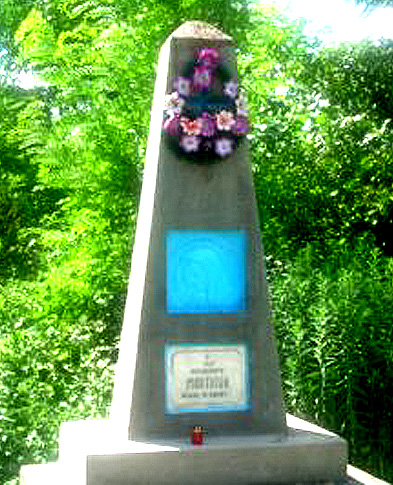
2. Gravestone of the Martyuk family, where Olena Martyuk Kovalishina is buried |
As it was dangerous for people living in the Soviet Union to correspond with foreigners, the Edelsteins hesitated to contact their rescuers. In the 1960s, they wrote to them for the first time and they corresponded for many years thereafter. Olena Kovalishina (born June 8, 1901) died on June 8, 1988. Nikolai Getman (born February 29, 1920) died November 19, 1987.
In 1999, Munio Edelstein returned to Skala. He visited Olena's son Miron Kovalishin and the widow of Nikolai Getman. In 2004, Yad Vashem recognized the heroism of Mrs. Kovalishina and Mr. Getman and named them as Righteous Among the Nations. |
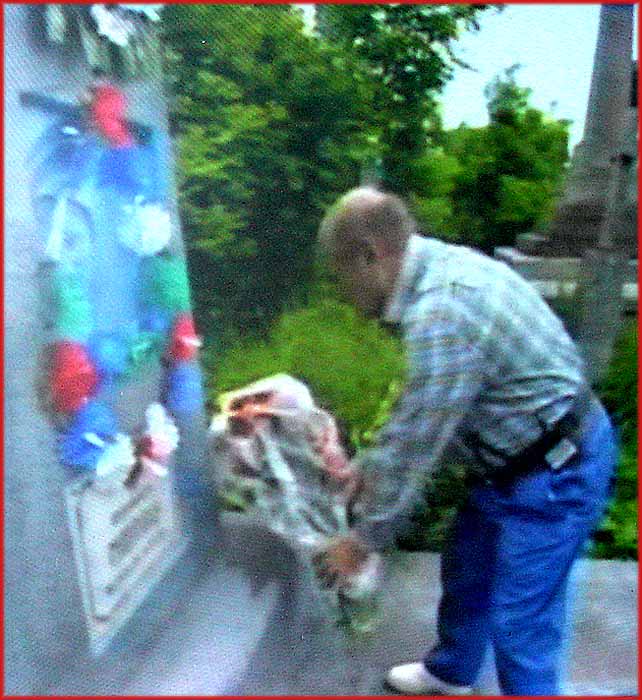 |
3. Holocaust survivor Michael (Munio) Edelstein
putting flowers on Olena Kovalishina's grave (1999). |
| 4. Michael (Munio) with Olena's son Miron. "I am
making up for her goodness in helping us
by helping her children," Michael (Munio) said.
Miron knew what his mother was doing,
but "he kept quiet," while others in Skala
betrayed their Jewish neighbors, Michael (Munio) noted. | 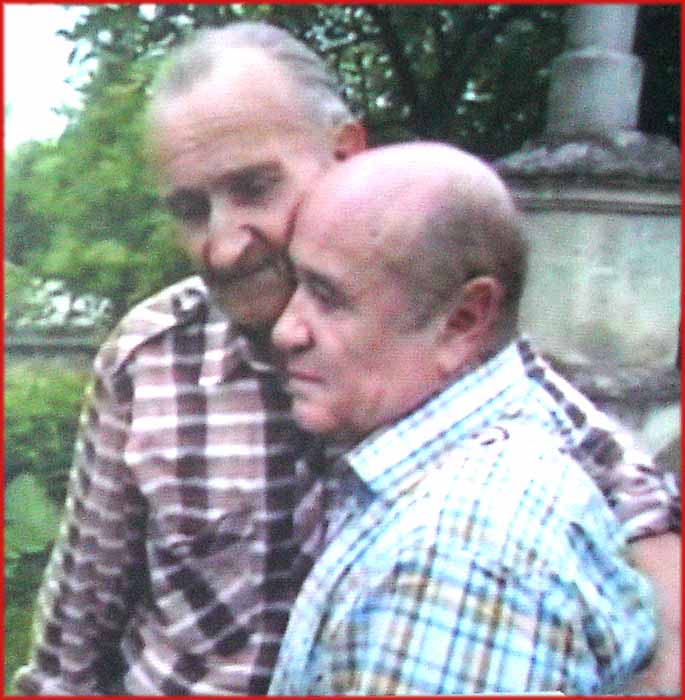 |
|
| 5. "I am alive because of his mother," said
Michael (Munio)'s son Ronald when he met
Miron in 1999. Miron died in 2006. |
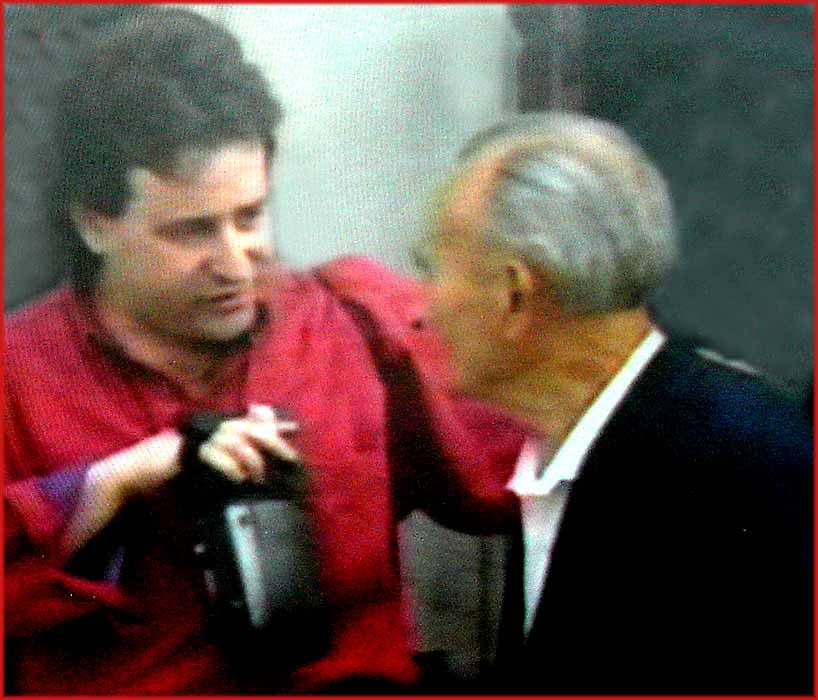 |
List of Righteous Gentiles from "Light in the Darkness:
Righteous Gentiles Who Saved Skala Jews"
in the Skala Yizkor Book
(see Chapter in book for their righteous stories)
| Stetka Atamaniuk, who with her husband Antoshko and son Petrus, saved 12 SkaJa Jews. |
| Paraska and Fedorko Babyichuk. |
| Ahafia and Petro Martiuk, the saviors of Gedalyahu Lachman |
| The Skawinski family who saved the Hescheles family |
| Maria KapaciIa, mother-in-law and full partner in the rescue of the Hescheles family |
| Sidor Sokolowski, the savior of Fanya Gottesfeld-Heller and her |
|
Muncia Uhrinska , the incredible savior of two Jewish girls |
| Olena Kovalyshyn (nee martiuk) who helped save Michael Edlestein |
If you have a story to tell about someone in Skala who was one of the Righteous Among the Nations, please contact Helene Kenvin
.
Information about the deeds of Olena Kovalishina and Nikolai Getman courtesy Yad Vashem Archive
Yad Vashem material translated from Hebrew by Rachel Kreisberg-Zakarin and edited by Helene Kenvin
Photo 1 courtesy Michael Edelstein
Photo 2 copyrighted by Paul J. Blank
Photos 3-5 captured from the video "Nothing's Changed," copyrighted by Michael Edelstein and used with permission
This page created by Max Heffler
Updated Feb 11, 2020. © Copyright 2005 Skala Research Group. All Rights Reserved.

